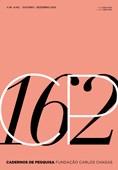Education research and scientific bricolage: diligence, multireference and interdisciplinary
Keywords:
Educational Research, Interdisciplinarity, Teacher Education, Research MethodologyAbstract
This study discusses the issue of scientific bricolage in education research, raising reflections based on the experience of post-graduate students. This approach takes into account the diligence, complexity and interdisciplinarity aspects of the production of scientific knowledge on teacher training. This discussion was supported by the theoretical-methodological framework and the analysis of data originating from qualitative research. Semi-structured interviews were used as the main technique. We noticed that interviewees conceive scientific bricolage as a challenge and at the same time as an alternative that promotes researcher creativity. They understand that to become a bricoleur scientist demands time, diligence and thorough analysis.
Downloads
References
ARDOINO, Jacques. Abordagem multirreferencial (plural) das situações educativas e formativas. In: BARBOSA, Joaquim Gonçalves (Org.). Multirreferencialidade nas ciências e na educação. São Carlos: EdUFSCar, 1998.
BORBA, Sérgio da Costa. Aspectos do conceito de multirreferencialidade nas ciências e nos espaços de formação. In: BORBA, Sérgio da Costa (Org.). Reflexões em torno da abordagem
multirreferencial. São Carlos: EdUFSCar, 1998.
BOUFLEUR, José Pedro. Pedagogia da ação comunicativa: uma leitura de Habermas. 3. ed. Ijuí: Editora Unijuí, 2001.
DENZIN, Norman K.; LINCOLN, Yvonna S. Introdução: a disciplina e a prática da pesquisa
qualitativa. In: DENZIN, Norman K.; LINCOLN, Yvonna S. O planejamento da pesquisa qualitativa: teorias e abordagens. Porto Alegre: Artmed, 2006.
DURAND, Gilbert. Multidisciplinaridades e heurística. In: BARBOSA, Joaquim Gonçalves (Org.). Multirreferencialidade nas ciências e na educação. São Carlos: EdUFSCar, 1998.
ESTEBAN, Maria Paz Sandín. Pesquisa qualitativa em educação: fundamentos e tradições. Tradução de Miguel Cabrera. Porto Alegre: AMGH, 2010.
GAMBOA, Sílvio S. Tendências de pesquisa em educação: um enfoque epistemológico. In:
GAMBOA, Sílvio S. Pesquisa em educação: métodos e epistemologias. Chapecó: Argus, 2012.
HENNING, Paula Corrêa. Profanando a ciência: relativizando seus saberes, questionando suas
verdades. Revista Currículo sem Fronteiras, v. 7, n. 2, p. 158-184, jul./dez. 2007.
KINCHELOE, Joe L.; BERRY, K. S. Pesquisa em educação: conceituando a bricolagem. Porto Alegre: Artmed, 2007.
KINCHELOE, Joe L.; McLAREN, Peter. Repensando a teoria crítica e a pesquisa qualitativa. In: DENZIN, Norman K.; LINCOLN, Yvonna S. (Org.). O planejamento da pesquisa qualitativa: teorias e abordagens. Porto Alegre: Artmed, 2006.
LAPASSADE, Georges. Da multirreferencialidade como “bricolagem”. In: BARBOSA, Joaquim Gonçalves. Multirreferencialidade nas ciências e na educação. São Carlos: EdUFSCar, 1998.
MACEDO, Roberto Sidnei. Por uma epistemologia multirreferencial e complexa nos meios
educacionais. In: BARBOSA, Joaquim Gonçalves (Org.). Reflexões em torno da abordagem
multirreferencial. São Carlos: EdUFSCar, 1998.
Downloads
Published
How to Cite
Issue
Section
License
Copyright (c) 2016 Cadernos de Pesquisa

This work is licensed under a Creative Commons Attribution-NonCommercial 4.0 International License.
Authors who publish in this journal agree to the following terms:
a. Authors retain the copyright and grant the journal the right to first publication, with the paper simultaneously licensed under the Creative Commons Attribution license that allows the sharing of the paper with acknowledgment of authorship and initial publication in this journal.
b. Authors are authorized to assume additional contracts separately, for non-exclusive distribution of the version of the paper published in this journal (for example publishing in institutional repository or as a book chapter), with acknowledgment of authorship and initial publication in this journal.
c. Authors are allowed and encouraged to publish and distribute their paper on-line (for example in institutional repositories or on their personal page) at any moment before or during the editorial process, as this can generate productive changes, as well as increase the impact and citation of the published paper (See The Effect of Open Access).









